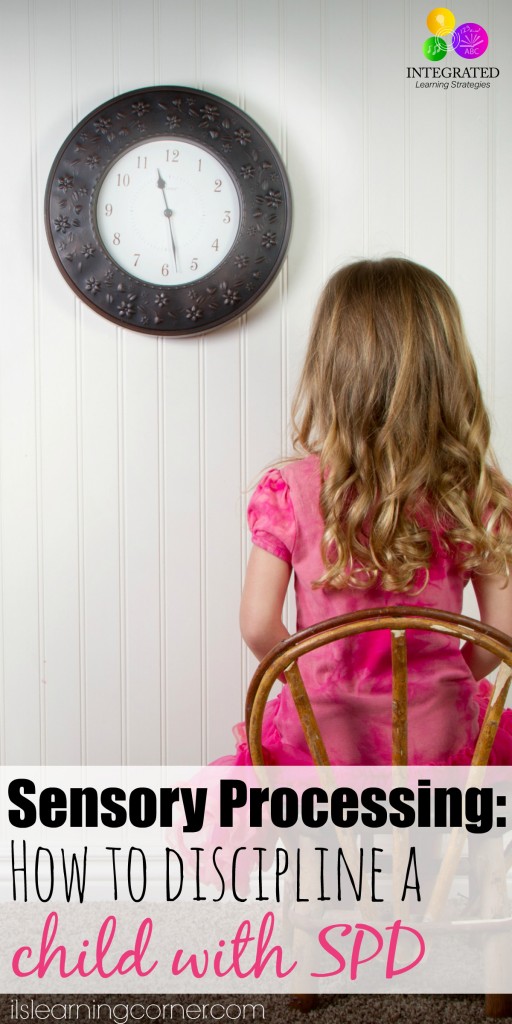We love our kids with Sensory Processing Disorder (SPD). They give us interesting perspectives on life. And they’re our kids; how could we do anything but love them? But, let’s be honest, sometimes it’s downright hard. You can live on pins and needles, dreading whatever it is that will trigger their next meltdown. Or maybe you know what sets them off and you cringe when you know there’s little you can do to stop it from happening. Mid-meltdown it’s tempting to give them whatever it will take to get them to stop. And then once they’re calmed back down what do you do? You know the meltdown was triggered by a system overload so you want to be understanding, but you can also see the wheels turning in their head. They’ve gotten a few too many passes and they know those meltdowns are working to their advantage. It’s a hard line to walk and it’s incredibly frustrating.
Disciplining Sensory Processing
The thing about SPD kids is that it’s about planning ahead. This idea works with all kids actually. If you’re always trying to correct after the fact, you’ll get stuck in a vortex of useless and even harmful discipline. Nancy Peske, co-author of Raising A Sensory Smart Child, said, “when a child’s behavior is due to Sensory Processing Disorder, punishments and rewards do not work as motivators.” I’ve found myself in numerous battles with my daughter, spewing out statements like, “that’s not an acceptable reason to yell at your brother,” or just resorting to “go on time out,” because I honestly didn’t know what else to do. But the real trick to helping these kids lies in proper physical activity, coping skills, and responsibility.
Don’t Restrict Movement Before Bedtime
Or before other tasks that require concentration or cooperation for that matter. It’s easy to fall into the trap of thinking that letting them get into a physical activity before calm time is going to get them wound up and unable to settle down, but many times it’s quite the opposite. Free movement and physical activity are exactly what these kids need to regulate their systems so they can sit calmly or stay focused.

Don’t Use The Same Sensory Tricks
Sensory activities only work for so long. I’m sure you’ve already noticed. You find something that works like a charm and then suddenly it doesn’t. Variety is the key. Change things up on a regular basis or switch out activities if you notice an uptick in negative behavior. Experiment, let them show you what does and doesn’t work and let them in on the fun. It never hurts to work together.
Don’t Give In To Meltdowns
Like I said, as tempting as it can be to give them what they want just to restore peace, you can’t give in. They may not know what the word manipulate means, but they sure learn how to quickly. Giving in actually escalates the problem. They’ll push harder next time because they know you have a breaking point. Instead, redirect. When they’re wound up, they can’t be reasoned with, but they can be distracted. If you need to get them out of a situation first, use short commands that are easy to process and then move on to redirecting. I often use humor and silliness because that’s something my daughter identifies with. Just make sure your redirect doesn’t resemble a reward. Also try taking a minute to figure out what really has them acting out. Over stimulation? Under stimulation? Hungry? Tired? If you can determine their trigger, you can find the right response to curb the meltdown.

Don’t Answer For Them
A great way to help them develop responsibility for their SPD is to make them speak for themselves. When you explain their triggers and behaviors for them, it’s reinforcing the idea that SPD is their go-to excuse. But if they have to explain the situation themselves, they learn to express themselves better and it shows them that this condition is theirs to manage. It may also force them to own up to poor behavior when you both know they know better.

Don’t Enable Them
Certain accommodations sometimes need to be made to help SPD kids. They need their clothes to fit right and certain levels of activity in order to focus for example. But it’s all too easy to fall into the trap of using SPD as an excuse. They can blame all their misbehavior and poor decisions on SPD and never have to take responsibility for any of it. Instead of letting this negative thinking pattern sink in, we can teach them that their SPD is their responsibility. Over time they can learn to be responsible for making sure their clothes fit their criteria for comfort. They can ensure they get enough physical activity before they get ready to work on their homework. You can help them figure out what their triggers are and what coping mechanisms work for them, but make sure when they are at an appropriate age they know they’re responsible for noticing when their triggers are being tripped and teach them how to implement a coping skill to solve the problem. Because at the end of the day, SPD or not, they still have to learn to regulate their emotions on their own, fulfill their duties as student and family member, use basic social manners, and treat those around them with respect.
Integrated Learning Strategies is a Utah-based center dedicated to helping mainstream children and children with learning disabilities achieve academic success. Our services provide kids with non-traditional tutoring programs within the Davis County, Kaysville, Layton, Syracuse, Farmington, and Centerville areas. Areas to find Integrated Learning Strategies include: Reading tutors in Kaysville, Math tutors in Kaysville, Common Core Tutors in Kaysville, Tutors in Utah, Utah Tutoring Programs
